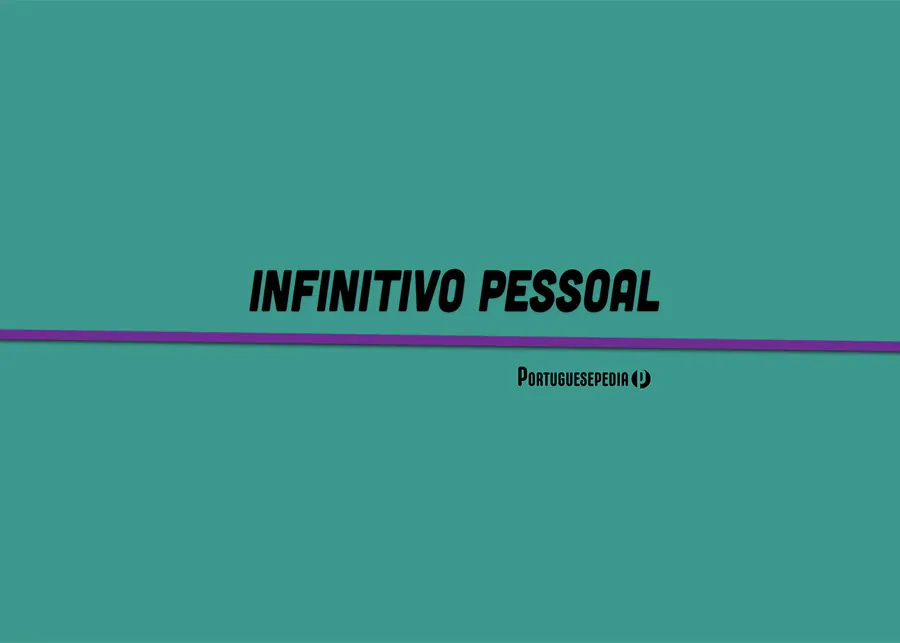
Personal Infinitive in Portuguese (Infinitivo Pessoal)
The Personal Infinitive (Infinitivo Pessoal) is unique to Portuguese and commonplace. There’s no parallel in other languages and learners of Portuguese often struggle to wrap their heads around it.
We use the Portuguese Personal Infinitive in a few impersonal structures and subordinate clauses, namely concessive, final, and conditional clauses.
Another common and related question concerns the difference between Personal and Impersonal Infinitives (the Impersonal Infinitive is what people usually refer to when they say ‘Infinitive’).
In short, the Portuguese Personal Infinitive is a conjugated version of the Impersonal Infinitive. While the latter only represents the conceptual idea of the verb (dissociated from any tense, mood, or person), the former, through its conjugated verb forms, unveils the person to which the verb is referring.
Put another way, the Personal Infinitive makes it less abstract. Read on.
Conjugating the Personal Infinitive in Portuguese
It is easy to conjugate the Personal Infinitive. You take the “normal” Infinitive form – the Impersonal Infinitive – and a few conjugational endings, namely to the 2-person singular and all persons in the plural (added endings marked in bold in the tables below).
These endings are always the same regardless of the conjugation group (-ar, -er, -ir), or whether the verbs are regular or irregular.
Let’s look at 3 regular verbs, one for each conjugation group:
| Tomar | Vender | Decidir | |
| Eu | tomar | vender | decidir |
| Tu | tomares | venderes | decidires |
| Ele, ela | tomar | vender | decidir |
| Nós | tomarmos | vendermos | decidirmos |
| Vocês Eles, Elas | tomarem | venderem | decidirem |
Note! For regular verbs, the verb forms of the Personal Infinitive happen to be the same as the Future Subjunctive, but not concerning irregular verbs.
Learn more about the Portuguese Future Subjunctive: Portuguese Future Subjunctive (Futuro do Conjuntivo).
And here are 3 irregular verbs with the exact same conjugation pattern as above:
| Ser | Fazer | Ir | |
| Eu | ser | fazer | ir |
| Tu | seres | fazeres | ires |
| Ele, ela | ser | fazer | ir |
| Nós | sermos | fazermos | irmos |
| Vocês Eles, Elas | serem | fazerem | irem |
When to use the Personal Infinitive in Portuguese
For the most part, the Personal Infinitive in Portuguese is used in complex sentences and is normally placed inside the dependent clause right after a linking word or phrase. Below, I will guide you through several such structures with concrete examples.
A couple of things before we start.
As we go through the examples, you will realize that we use the Personal Infinitive in structures where we often also use the Present Subjunctive*.
In that sense, they are closely related and whether we use one or the other depends on the linking word or phrase. For instance, the Present Subjunctive is strongly associated with the linking word que.
* Learn more about the Present Subjunctive in Portuguese: Present Subjunctive in Portuguese: How and When to Use It.
Impersonal structures
We often use the Personal Infinitive in the following impersonal structure:
é + adjective + personal infinitive
Here are a couple of examples:
| É importante (tu) ficares em casa a descansar. You must stay at home and rest. É imprudente (nós) irmos à rua com este tempo. It is not reasonable that we go out in this weather. É provável (eles) chegarem depois das 15h. They are likely to arrive after 3 p.m. |
Note that we’d use the Present Subjunctive if we added que before the verb:

Olá! I'm Pedro and I'm your Portuguese teacher.
Ready to unlock the beauty of European Portuguese? Portuguesepedia is your key! This all-in-one platform provides a wealth of learning resources, from bite-sized video lessons to immersive idiomatic dips. Perfect your pronunciation and aural comprehension with listening drills and solidify your grammar with in-depth articles. Start your Portuguese journey today!
Share this article
Get my guide "Key Strategies to Learn Portuguese" for FREE.
